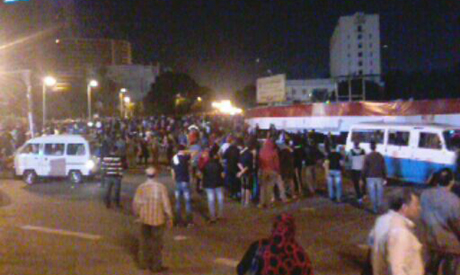
Clashes near the Arab league building in Tahrir square on Tuesday night (photo: Osman El Sharnoubi)
Police forces stationed near the Arab League headquarters, just west of Tahrir Square, fired teargas at a group of anti-military, anti-Brotherhood protesters who had launced fireworks in the direction of security forces, Ahram Online reporter at the scene said.
Meanwhile, scuffles broke out in the ealier evening hours between supporters of the army and their opponents in Abdel-Moneim Riad Square on the edges of Tahrir Square on Tuesday evening. At the time of publication, protesters were reportedly pelting each other with stones and had disrupted traffic in the area near the 6 October Bridge.
Several thousand anti-military, anti-Brotherhood protesters had gathered in Cairo's Tahrir Square on Tuesday evening for the second anniversary of the Mohamed Mahmoud clashes.
Numbers continued to grow throughout the afternoon and into the evening hours amid tension between pro- and anti-military protesters.
Scuffles broke out in the morning at the nearby Abdel-Moneim Riad Square between pro- and anti-military, anti-Brotherhood protesters. Stones were thrown and traffic disrupted, Al-Ahram Arabic news website reported.
Limited scuffles also took place in front of the High Court in Ramses Square, with rival protesters holding up banners in support of and in opposition to army chief Abdel-Fattah El-Sisi.
Three people were injured during clashes in Cairo by late afternoon on Tuesday, with nine more across the country, according to the ambulance authority.
During the afternoon, several thousand protesters, mostly young people, arrived in Mohamed Mahmoud Street from Talaat Harb Street chanting against Interior Minister Mohamed Ibrahim. Flags of the April 6 Youth Movement, Revolutionary Socialists and 'Way of the Revolution Front' were prominent. Empty caskets bearing the faces of slain protesters were carried aloft.
"I am here to demand retribution for the martyrs and for reform of the interior ministry," Ahmed El-Masry of the April 6 Democratic Front told Ahram Online.
"I respect those who demonstrated yesterday but I am here today because it is the actual anniversary of Mohamed Mahmoud," he added.
Several thousand people demonstrated on Monday, saying they wanted to avoid clashes which would be "exploited by the state and the Muslim Brotherhood."
"People came to this rally when they heard the Brotherhood would not be protesting in Mohamed Mahmoud or Tahrir," Sarah Mohamed of the Revolutionary Socialists told Ahram Online.
Mohamed said she wanted former military council head Mohamed Hussein Tantawi, ousted president Mohamed Morsi and army chief Abdel-Fattah El-Sisi to be tried for killing protesters.
The Way of the Revolution Front, a new group aiming to provide a revolutionary alternative amid the current polarisation between the military and the Brotherhood, said Brotherhood supporters were not welcome at the protest.
A banner was hung by activists on Monday night at the entrance to the street reading: "Muslim Brotherhood, military and feloul (remnants of the old regime) are not allowed."
Late on Monday night, revolutionary groups damaged the base of a memorial being erected by the interim authorities to commemorate those killed during Egypt's revolution. They claimed reconciliation with the interior ministry, responsible for killing many protesters during the revolution, was impossible. They demanded the "purging" of the interior ministry.
Days of clashes between anti-military council protesters and security forces erupted in Mohamed Mahmoud Street on 19 November 2011, leaving 47 dead and at least 3,000 injured.
At the time, the Muslim Brotherhood and their Islamist allies denounced the protesters, accusing them of trying to disrupt parliamentary elections which were scheduled to start a week later.
The clashes took place while the country was being governed by the Supreme Council of the Armed Forces following president Hosni Mubarak's ouster in February 2011. Clashes also erupted on the first anniversary of clashes, when Mohamed Morsi was president, leaving three dead.
Short link: